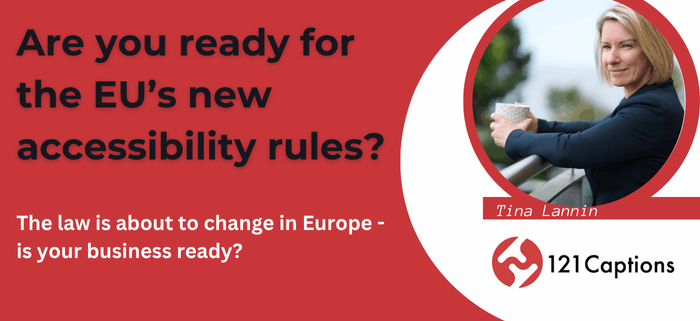Are your events ready for the EU’s new accessibility rules?
In 2025, the way events are planned and delivered across Europe is changing. With the upcoming enforcement of the European Accessibility Act (EAA), event organisers, corporates, and public sector bodies must ensure that accessibility is built into every aspect of their communications, including conferences, webinars and internal meetings.
Accessibility is no longer a nice-to-have; it’s a legal requirement. If your organisation operates in the EU – or works with partners who do – this affects you.
Understanding the European Accessibility Act
The EAA is set to take effect in June 2025, and it aims to create a common set of accessibility rules across the European Union. While it focuses heavily on digital services and products, it also impacts how information is delivered in real-time, especially for virtual and hybrid events.
Here’s what the EAA will expect from businesses and organisations:
- Information must be perceivable and understandable by people with disabilities.
- Real-time communications (such as webinars, online training, and live events) must be accessible to Deaf and hard-of-hearing individuals.
- Public sector bodies and service providers must offer accessible alternatives to spoken content, including live captioning and sign language interpretation.
- Content should be delivered in accordance with WCAG 2.1 accessibility standards.
Who needs to take action?
The new rules apply to a wide range of sectors, including:
- Corporate enterprises delivering training or holding shareholder events.
- Public authorities running town hall meetings, council sessions, or community outreach events.
- Event companies and agencies hosting conferences, expos, or live-streamed product launches.
- Educational institutions offering online or hybrid learning.
If your business or organisation is delivering any form of live digital content, you’ll need to ensure it’s accessible—or risk non-compliance, reputational damage, and possible penalties.
How live captioning supports compliance
Live human captioning provides real-time text versions of spoken content, allowing attendees who are Deaf, hard of hearing, neurodivergent, or non-native speakers to follow along with ease. Captioning enhances:
- Comprehension for all participants
- Inclusion by removing barriers to participation
- Engagement in noisy environments or when audio quality is poor
- Legal compliance with the EAA and other regional laws
Automated captions may be tempting, but they often fall short in accuracy and contextual understanding. Human captioners, like those at 121 Captions, ensure your content is transcribed clearly, correctly, and in real time.
Adding sign language interpretation to your event
In addition to captioning, sign language interpretation is a vital accessibility tool. Many Deaf individuals use BSL, ISL, or ASL as their first language, and providing interpreters ensures that they can fully engage with your event.
Sign language support is often required under both UK and EU accessibility laws, especially for events hosted by public bodies or intended for diverse audiences.
The business case for accessibility
Beyond compliance, offering accessible events makes strong business sense. Accessibility:
- Expands your audience
- Enhances brand reputation
- Reflects your commitment to Diversity, Equity, and Inclusion (DEI)
- Futureproofs your organisation against further regulatory changes
Accessible events are better events – for everyone.
Stay ahead of EU regulations with 121 Captions
At 121 Captions, we provide expert human live captioning and sign language interpretation tailored to your needs. We support multiple languages, platforms, and event types, whether in-person, virtual or hybrid.
Don’t wait until June 2025. Prepare now and ensure your events are inclusive, professional and fully compliant with the new EU regulations.
Contact us today to discuss your next event or request a quote.




Leave a Reply
Want to join the discussion?Feel free to contribute!